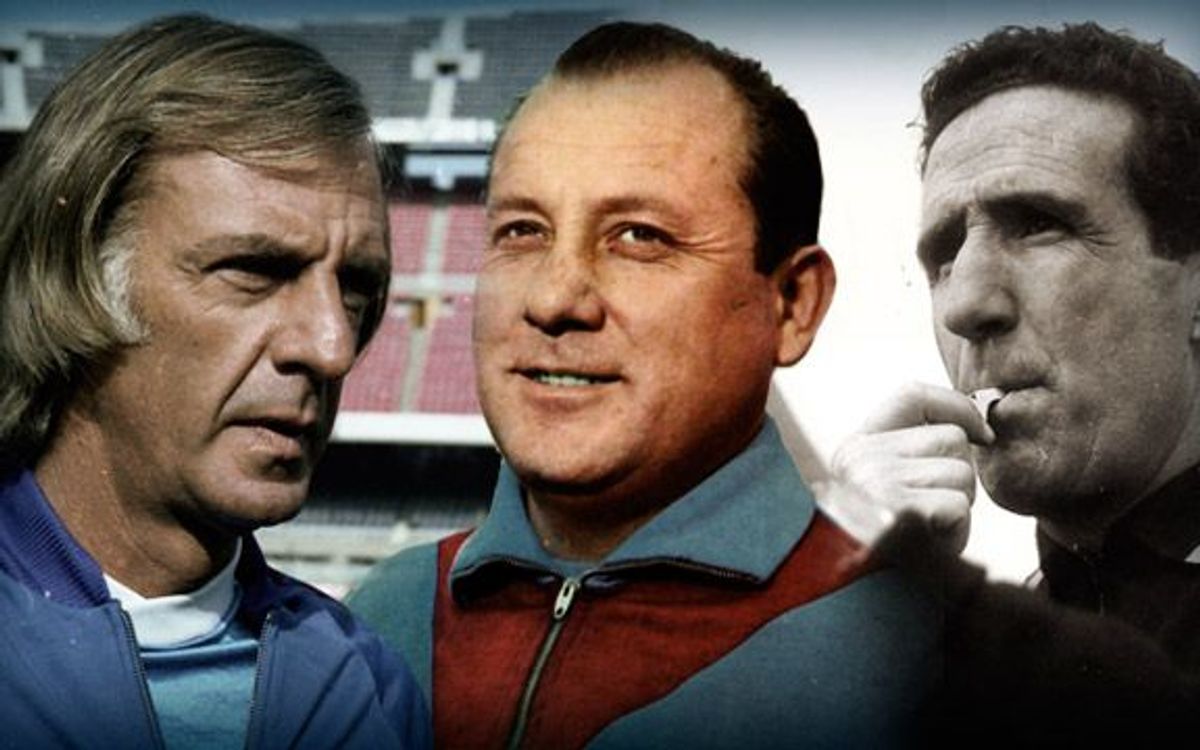Martino is the fourth Argentinian coach in Barça history
- label.aria.viber Viber
- label.aria.whatsapp WhatsApp
- label.aria.twitter Twitter
- label.aria.facebook Facebook
- label.aria.messenger Messenger
- label.aria.link label.aria.tick Copy link
Gerardo Martino is the fourth Argentinian boss that Barça have had over the years. All of Helenio Herrera (1958-60, 1980 and 1980-81), Roque Olsen (1965-67) and César Luis Menotti (1983-84) have been in charge in the past under very different circumstances and with varying fortunes. Arguably the biggest impact of all was that of the controversial Helenio Herrera, known as HH.
Herrera the mastermind
Born to Andalusian emigrants in Buenos Aires in 1910, Helenio Herrera managed Valladolid, Atlético Madrid (winning the league in 1949-50 and 1950-51), Malaga, Deportivo and Sevilla. In late 1957-58 he took over at Barça as a replacement for the dismissed Domènec Balmanya. The fans soon learned about the peculiarities of the man known as ‘the Magician’, a veritable genius when it came to preparing his players psychologically, and a man who thrived on confrontation. He was also obsessive about analysing opponents, with incredible knowledge of the facets of every single one of the eleven he was up against.
Helenio Herrera’s Barça featured such big names as Ramallets, Suárez and Kubala, and his time at the club, 1958-60, led to a flurry of titles in the form of two Fairs Cups (1957-58 and 1959-60), two Ligas (1958-59 and 1959-60) and one Cup (1958-59). However, elimination in the semi-finals of the European Cup led to HH being sacked in 1959-60. After that he moved to Inter Milan, where he won a further collection of major titles.
In March 1980, after five years out of work, he made a surprise comeback to Barça as a substitute for Joaquim Rifé. There were only twelve games of the 1979-80 season left and FCB were struggling, but Herrera aimed to at least win the club a place in the UEFA Cup, and managed to do that.
In November of the same year he was called upon as an emergency solution, this time for Ladislau Kubala. He made radical changes, and Barça would probably have won the league had it not been for the kidnapping of Quini, an event so shocking that it completely upset Barcelona’s good form. But with the Asturian finally back in freedom, Helenio Herrera was able to lead Barça to Copa del Rey victory in 1981.
Olsen at a bad time
Another Argentinian, Roque Olsen, was born in Sauce de Luna in 1925. After managing such sides as Cordoba, Deportivo and Real Zaragoza, in 1965 he was the chosen substitute for Vicenç Sasot on the FCB bench. Those were not easy times at Barça, immersed in a profound sporting crisis and in a period of transition with big names like Gallego, Torres and Muller playing alongside emerging talents like Rexach and Pujol, who the tough-minded Olsen was reluctant to trust. However, it was a hat-trick from Lluís Pujol at La Romareda that won Olsen his only title at Barcelona, the Fairs Cup 1965/66 against his former club Zaragoza. The next season ended empty-handed and Olsen was sacked.
Menotti, great manager but luckless at Barça
Born in Rosario in 1938, César Luis Menotti was a much sought-after manager after leading his country to the 1978 World Cup title. He came to Barça in March 1983 as a replacement for Udo Lattek, who had not been getting the results that were needed, partly because of the hepatitis being suffered by superstar Diego Armando Maradona. Menotti’s first game in charge also marked Maradona’s return, but FCB were knocked out of the Cup Winners Cup. However, they ended up winning the league and cup double, seeing off challenges from Real Madrid in both competitions.
The following season was a lively one, and Barça missed out to Bilbao by one point in the league. But it hadn’t been easy with both Maradona and Schuster seriously injured. Barça lost an incident-packed cup final to Athletic Bilbao, meaning that the only silverware in 1983/84 was the Spanish Supercup. At the end of the season, Menotti returned to his country, but had made a good impression on Barcelona with his footballing knowledge and his willingness to play youngsters like Rojo and Calderé.
- label.aria.viber Viber
- label.aria.whatsapp WhatsApp
- label.aria.twitter Twitter
- label.aria.facebook Facebook
- label.aria.messenger Messenger
- label.aria.link label.aria.tick Copy link

